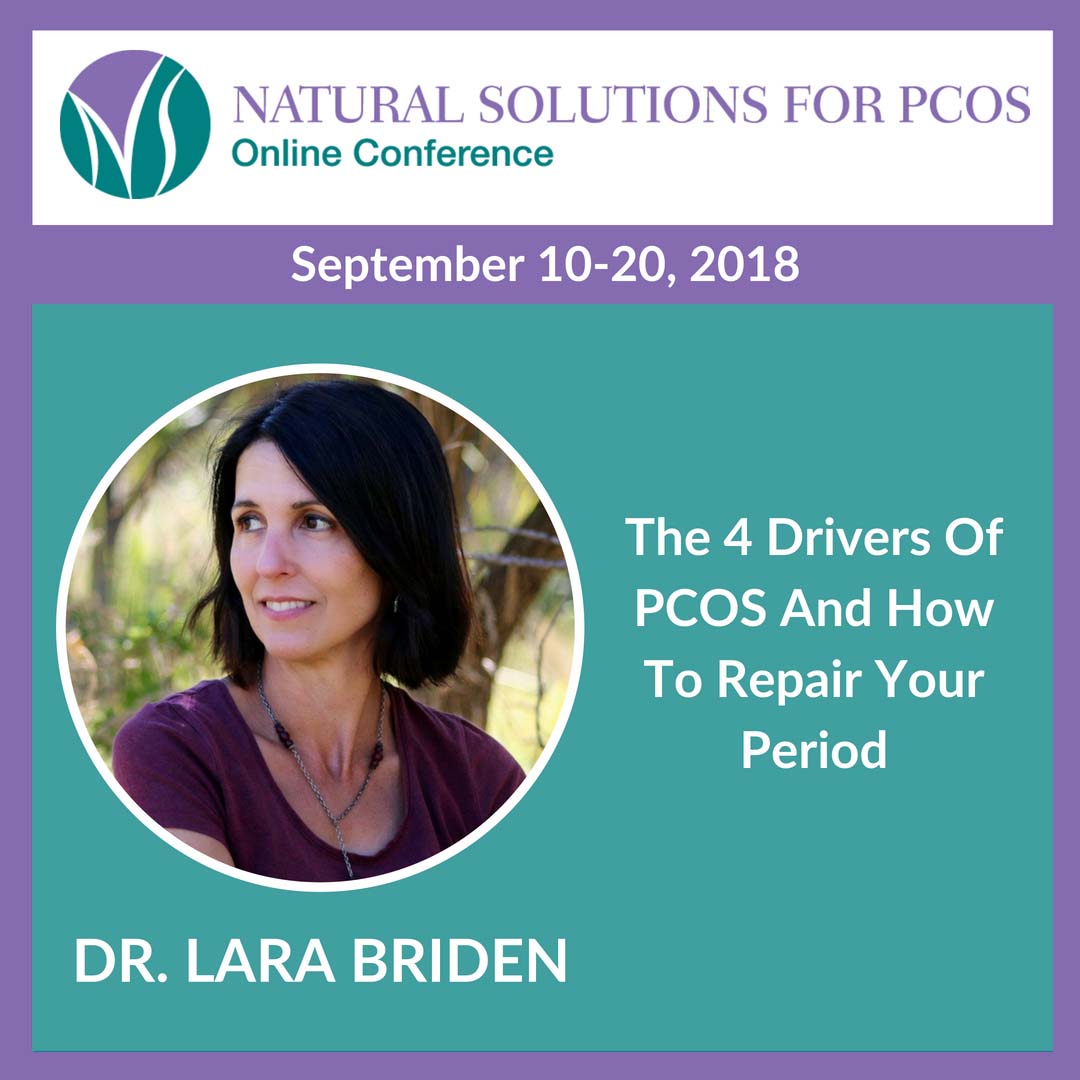
By Lara Briden
I invite you to think differently about polycystic ovarian syndrome.
PCOS is not one thing. It is not one disease. PCOS is a set of symptoms. The key primary symptom is failure to ovulate regularly. Failure to ovulate is why you are deficient in estradiol and progesterone. It’s why you have high testosterone, and why you develop secondary PCOS symptoms such as hair loss, acne, and infertility.
You cannot treat PCOS until you first ask: “WHY — in your particular case — do you not ovulate?”
I say “in your particular case” because your reason may be different than someone else’s reason. That’s why there are so many different natural treatments, and that’s why only some will work for you.
Join the Natural Solutions for PCOS Online Conference to hear Lara’s interview!
Don’t be too quick to accept a PCOS diagnosis. Proper diagnosis requires a blood test that shows high testosterone or other male hormones like androstenedione or DHEA. Never accept a diagnosis that was made by ultrasound alone.
4 Types of PCOS
1) Insulin-Resistant PCOS
This is the classic type of PCOS and by far the most common. High insulin and leptin impede ovulation and stimulate the ovaries to make testosterone. Insulin resistance is caused by sugar, smoking, trans fat, and environmental toxins.
Is this you? You have been told that you are borderline diabetic, or you had an abnormal glucose tolerance test. You probably have elevated insulin, and you may also have elevated LH (luteinizing hormone). You are probably overweight, although you may be normal weight. Normal-weight insulin resistance can occur in the years following dieting or eating disorder.
Treatment ideas: The first step is to quit sugar. A small amount of fructose is healthy but a large amount is a major contributor to insulin resistance. Please also consider gentle intermittent fasting, which works well to improve insulin sensitivity. Best supplements for insulin resistance are magnesium, lipoic acid, inositol, and berberine. The Pill is not a treatment for this type (or any type) of PCOS because it impairs insulin sensitivity. Improvement for Type 1 PCOS is slow and gradual over 6-9 months.
2) Pill-Induced PCOS or Post-Pill PCOS
Hormonal birth control suppresses ovulation. For most women, it’s a temporary effect, and ovulation will usually resume fairly soon after the Pill is stopped. But for some women, ovulation-suppression can persist for months or even years. During that time, it is not unusual to be given the diagnosis of PCOS. Some experts deny the existence of Pill-induced PCOS, but it is very real. It is the second most common type of PCOS that I see. I have spoken to many other clinicians who are seeing the same thing. We desperately need more research into it.
Is this you? You had regular periods before starting the Pill, although you may have had acne. You probably now have elevated LH on a blood test, although you may have normal LH and high-normal prolactin.
Treatment ideas: If your LH is elevated, the best herbal treatment is Peony & Licoricecombination. If your prolactin is high-normal, then the best herbal treatment is Vitex (also called chaste tree or chaste berry). Do not use Vitex if your LH is elevated. Vitex stimulates LH so it will make things worse. Indeed, many of my PCOS patients report feeling worse on Vitex.
Both Peony and Vitex work on your pituitary-ovarian axis, and they are powerful herbs. I recommend you do not use them too soon or for too long. Do not take them if you are a teenager, or if you have just come off the Pill. Give yourself at least 3-4 months off the Pill. Do not use Peony or Vitex for more than 10 months in a row. They should not need to be used that way. If they are the right herbs, they will work fairly quickly (within 3-4 months). And then, your periods should stay regular after you stop the herbs. Do not take licorice if you have high blood pressure. Please seek professional advice.
3) Inflammatory PCOS
Inflammation—or chronic immune activation—results from by stress, environmental toxins, intestinal permeability and inflammatory foods like gluten or A1 casein. Inflammation is a problem for PCOS because it impedes ovulation, disrupts hormone receptors, and stimulates adrenal androgens such DHEA and androstenedione.
Join the Natural Solutions for PCOS Online Conference to hear Lara’s interview!
Is this you? You have other symptoms of immune dysfunction such as recurring infections, headaches, joint pain or skin conditions. Your blood test shows inflammatory biomarkers such as vitamin D deficiency, abnormal blood count, elevated C-RP, thyroid antibodies, or gluten antibodies. You may have elevated DHEA or androstenedione, and a positive urine test for intestinal permeability.
Treatment ideas. Reduce stress and exposure to environmental toxins like pesticides and plastics. Eliminate inflammatory foods such as wheat, dairy, and sugar. Treat intestinal permeability with zinc, berberine, and probiotics. Supplement magnesium because it is anti-inflammatory and normalizes adrenal hormones (HPA axis). Improvement is slow and gradual over 6-9 months.
4) Hidden-Cause PCOS
This is the ‘simpler-than-you-think’ type of PCOS. Fairly often (at least once per week) I encounter a PCOS patient who does not meet any of the criteria for the first 3 types of PCOS. These are my favorite cases because it usually means that there is one simple thing that is blocking ovulation. Once that single thing is addressed, this type of PCOS resolves very quickly, usually within 3-4 months. Common hidden causes of PCOS include:
- Too much soy, because it is anti-estrogen and can block ovulation in some women. (A small amount is okay.)
- Thyroid disease, because your ovaries need T3 thyroid hormone.
- Vegetarian diet, because it causes zinc deficiency, and your ovaries need zinc.
- Iodine deficiency, because your ovaries need iodine. Please be careful with iodine supplementation.
- Artificial sweeteners, because they impair insulin and leptin signaling.
- Too little starch in your diet, because your hormonal system needs Gentle Carbs.
Is this you? You do not exactly fit the criteria for the first 3 types of PCOS. You have tried a number of natural PCOS treatments and nothing seems to work. Look deeper.
Know when it’s time to let go of your PCOS Diagnosis. In most cases, PCOS is not a permanent condition. With the right diagnosis and the right treatment, PCOS can become a thing of the past.
I am the first to acknowledge that there is some overlap between these 4 types. For example, inflammation is a major cause of both insulin resistance and thyroid disease (Types 1, 3, and 4). My intention was not to over-simplify, but rather to alert you to some treatment ideas that you have not yet considered.
Join the Natural Solutions for PCOS Online Conference right now, where you can hear Lara’s interview!
Next Steps
- Take the PCOS Quiz! Get your score and assess your hormone health risks.
- Join our Facebook Sisterhood Group Pose your questions to this group of like-minded women. Get the answers to your questions and the support you need.
- Checkout the Hormone Reset. Guided Practices to eliminate anxiety, lose weight and boost energy.
We are committed to helping women reverse their symptoms of hormone imbalance – a major cause of excess weight gain, adult acne, unwanted facial hair, depression, anxiety, and heartbreaking female infertility.
©Insulite Health empowers women with hormone imbalance to transform their lives through a process of healing with the Natural Hormone Solution –a complete solution for helping women reverse the symptoms hormone imbalance..

